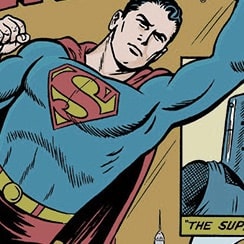Versuchen GOLD - Frei
The Trial - By Franz Kafka

Mit Magzter GOLD unbegrenztes Potenzial nutzen
Lesen The Trial zusammen mit über 9.000 anderen Zeitschriften und Zeitungen mit nur einem Abonnement
Katalog anzeigenAbonnieren Sie nur The Trial
Jederzeit kündbar.
(Keine Verpflichtungen) ⓘSollten Sie mit Ihrem Abonnement nicht zufrieden sein, senden Sie uns innerhalb von 7 Tagen nach Abonnementbeginn eine E-Mail an help@magzter.com, um eine vollständige Rückerstattung zu erhalten. Versprochen! (Hinweis: Gilt nicht für den Kauf einzelner Ausgaben.)
Digitales Abonnement
Sofortiger Zugriff ⓘAbonnieren Sie jetzt, um sofort mit dem Lesen auf der Magzter-Website sowie in den iOS-, Android- und Amazon-Apps zu beginnen.
Verifiziert sicher
zahlen ⓘMagzter ist ein verifizierter Authorize.Net-Händler. Weitere Informationen
In dieser Ausgabe
"Published posthumously in 1924 by Kafka’s friend, Max Trod, after his death, The Trial is a criticism of a totalitarian form of government, which traps an individual into systems of oppression and inhibits them from any means of escape. The protagonist of the story, Josef K, is accused of a crime that he didn’t commit. The absurdity of the entire ordeal, however, is that the nature of the crime is never revealed to him or to us, the readers. The more Josef K ventures into systems of authority and ‘justice’, to prove his innocence, the more he becomes entangled in the procedural complexities of the court and the justice system. His attempt to prove his innocence only implicates him further and the increasing uncertainty of his fate propels him towards making misguided choices.
Kafka’s works, more often than not, portray a bleak, hopeless world where a just society and governance is more a matter of imagination than reality. He compels his readers to question the monotony of the systems around them as well as structures of authority. Kafka’s The Trial represents a solemn yet surreal world where an individual is isolated; his freedom and his rights stifled; and any ‘trial’ that occurs is simply a farce wherein different structures of authority push an individual into an inescapable maze.
"
The Trial Description:
"Published posthumously in 1924 by Kafka’s friend, Max Trod, after his death, The Trial is a criticism of a totalitarian form of government, which traps an individual into systems of oppression and inhibits them from any means of escape. The protagonist of the story, Josef K, is accused of a crime that he didn’t commit. The absurdity of the entire ordeal, however, is that the nature of the crime is never revealed to him or to us, the readers. The more Josef K ventures into systems of authority and ‘justice’, to prove his innocence, the more he becomes entangled in the procedural complexities of the court and the justice system. His attempt to prove his innocence only implicates him further and the increasing uncertainty of his fate propels him towards making misguided choices.
Kafka’s works, more often than not, portray a bleak, hopeless world where a just society and governance is more a matter of imagination than reality. He compels his readers to question the monotony of the systems around them as well as structures of authority. Kafka’s The Trial represents a solemn yet surreal world where an individual is isolated; his freedom and his rights stifled; and any ‘trial’ that occurs is simply a farce wherein different structures of authority push an individual into an inescapable maze.
"
Ähnliche Titel

Priya's Shakti Comic Book

How to Develop Self-Confidence & Influence People By Public Speaking

The Story of My Experiments with Truth

Curiosity is the Way to Go

Animal Farm

Alexander The Great

Bhirgu Shmhita

The Haunted Forest

The Autobiography of Benjamin Franklin

Metamorphosis

Art of Public Speaking

Classic Stories of Charles Dickens & Jack London

Great Personalaties of India

Classic Stories of Arthur Conan Coyle Edgar & Allan poe

Kingdom of Love

Classic Stories of Saki

Classic Stories of Ambrose Bierce

My Own Trumpet, My Own Drum

Quilled Galleria

As A Man Thinketh

Jane Eyre - by Charlotte Bronte

Star Wars - Pirate's Price

The Story of My Life

Twelve Years A Slave

The Art of Public Speaking - Dale Carnegie

The Interpretation of Dreams

Relativity: The Special and the General Theory

The Elemental Battlegrounds

Autobiography Of A Yogi

Gitanjali






















